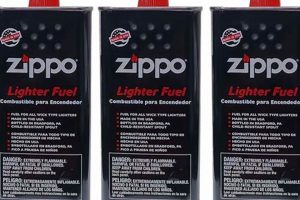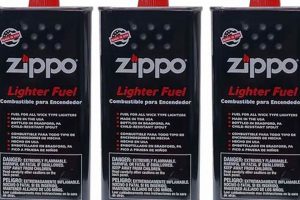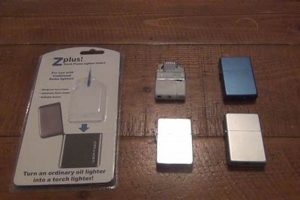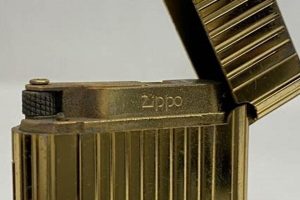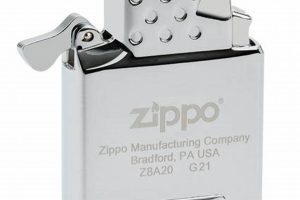Zippo lighters utilize a liquid fuel, typically naphtha, stored within an absorbent material inside the lighter casing. A wick draws the fuel upwards, and a flint wheel ignites the vapors produced by the fuel. This differs from butane lighters, which use pressurized butane gas as their fuel source, released through a valve and ignited by a spark.
The distinction between these fuel types is crucial for the function and maintenance of each lighter type. Naphtha-fueled lighters offer a wind-resistant flame, advantageous for outdoor use. Butane lighters, however, produce a consistent flame intensity and are often refillable, contributing to their popularity. The historical development of each lighter design reflects the availability and properties of their respective fuels.
This difference in fuel systems impacts various aspects of lighter use, including refueling methods, flame characteristics, and overall maintenance requirements. Further exploration will delve into the specific benefits and drawbacks of each type, along with safety considerations and environmental impact.
Understanding Fuel Types for Lighter Selection
Choosing the appropriate lighter requires understanding the differences between fuel types. This section offers essential tips to facilitate informed decisions regarding lighter purchase and maintenance.
Tip 1: Consider the intended environment. Windy conditions often necessitate a wind-resistant flame, making naphtha-fueled lighters a suitable choice for outdoor use.
Tip 2: Evaluate fuel availability and cost. Naphtha and butane are widely available, but regional price variations may exist. Refillable butane lighters offer long-term cost savings.
Tip 3: Prioritize consistent flame intensity. Butane lighters typically provide a consistent flame height and intensity, beneficial for tasks requiring precision.
Tip 4: Understand maintenance requirements. Naphtha lighters require occasional flint and wick replacement. Butane lighters need refilling, and occasional valve cleaning may be necessary.
Tip 5: Consider refillability. Disposable butane lighters are convenient, but refillable options reduce waste and offer long-term cost benefits. Zippo lighters are refillable with naphtha.
Tip 6: Recognize safety considerations. Always follow manufacturer instructions for refueling and maintenance to ensure safe operation of any lighter type.
Understanding the distinctions between lighter fuel types empowers informed decisions, leading to enhanced user experience and responsible lighter maintenance. These considerations are crucial for selecting a lighter that aligns with individual needs and preferences.
By considering these factors, individuals can select and maintain a lighter that best suits their needs and preferences, ensuring safe and efficient operation.
1. Zippo Fuel
Addressing the query “are Zippo lighters butane” requires a clear understanding of Zippo’s actual fuel source: naphtha. This clarification is crucial for proper lighter operation and maintenance, highlighting the fundamental incompatibility between Zippo lighters and butane fuel.
- Chemical Composition and Properties
Naphtha, a volatile hydrocarbon mixture, possesses distinct properties that differentiate it from butane. Its lower vapor pressure contributes to the characteristic wind-resistant flame of Zippo lighters. This contrasts with butane’s higher vapor pressure, which necessitates a different lighter design. Misunderstanding this fundamental difference can lead to improper fuel usage and potential lighter damage.
- Fuel Delivery System in Zippo Lighters
Zippo lighters utilize an absorbent packing material saturated with naphtha, combined with a wick system. This design facilitates controlled fuel delivery to the flint wheel ignition. This system is specifically engineered for naphtha and would not function correctly with butane due to the difference in fuel delivery mechanisms.
- Implications for Lighter Performance and Maintenance
The use of naphtha directly impacts Zippo lighter performance, offering a distinctive wind-resistant flame. Maintenance procedures, such as refilling and wick replacement, are also specific to naphtha-based systems. Attempting to use butane would not only compromise functionality but could also lead to clogging and damage.
- Safety Considerations and Best Practices
Using the correct fuel type is paramount for safe lighter operation. Attempting to fill a Zippo lighter with butane poses safety risks due to pressure buildup and potential leakage. Adhering to manufacturer recommendations regarding fuel type is essential for safe and effective use.
The use of naphtha in Zippo lighters is not arbitrary; it is integral to their design and functionality. Attempting to use butane in a Zippo lighter demonstrates a misunderstanding of these fundamental principles and could lead to malfunction and potential hazards. The “are Zippo lighters butane” question, therefore, underscores the importance of understanding fuel types and their respective lighter designs.
2. Not Butane
The explicit statement “Not butane” directly addresses the common query “are Zippo lighters butane?” This negation is crucial. It clarifies a fundamental distinction between these two fuel types and their respective lighter designs. Cause and effect come into play: using butane in a Zippo lighter, designed for liquid naphtha fuel, would clog the wick, prevent proper fuel flow, and ultimately render the lighter non-functional. The “Not butane” assertion, therefore, is not merely a technicality; it safeguards against improper fuel usage and potential damage to the lighter.
Real-world examples further illustrate this point. Imagine attempting to fill a kerosene lamp with gasoline. The incompatibility is clear. Similarly, attempting to use butane in a Zippo lighter, despite both being fuels, leads to incompatibility. Butane, a pressurized gas, requires a valved system for controlled release and ignition, as seen in typical butane lighters. Zippo lighters, however, employ an open wick system designed to draw liquid naphtha fuel upwards for ignition. This design difference underscores the “Not butane” imperative.
The practical significance of understanding this distinction is clear: proper lighter function and longevity depend on using the correct fuel. “Not butane” serves as a concise yet critical piece of information, preventing user error and ensuring the safe and effective operation of a Zippo lighter. Ignoring this distinction can lead to frustration, damage to the lighter, and potential safety hazards. Therefore, “Not butane,” in the context of “are Zippo lighters butane,” carries significant practical weight, highlighting the importance of fuel-type awareness in lighter selection and maintenance.
3. Distinct Fuel Types
The phrase “distinct fuel types” lies at the heart of the question “are Zippo lighters butane?” It underscores the fundamental incompatibility between these two fuels and their respective lighter designs. Cause and effect are directly linked: attempting to use butane, a pressurized gas, in a Zippo lighter designed for liquid naphtha will result in malfunction. The porous material inside a Zippo, designed to hold naphtha, would become saturated with butane, preventing proper fuel flow to the wick. This incompatibility highlights the critical importance of understanding the distinctions between fuel types.
Real-world analogies illustrate this concept. Consider the difference between a diesel engine and a gasoline engine. While both utilize internal combustion, their fuel requirements are distinct. Similarly, while both butane and naphtha are flammable liquids, their physical properties and delivery mechanisms necessitate different lighter designs. A Zippo lighter’s open wick system, designed for capillary action with liquid naphtha, cannot accommodate the pressurized delivery system required for butane. Attempting to substitute one for the other demonstrates a fundamental misunderstanding of “distinct fuel types.”
The practical significance of recognizing these distinct fuel types is paramount for proper lighter function and maintenance. Using the correct fuel ensures safe and efficient operation, while using the incorrect fuel can lead to malfunction, damage, and potential safety hazards. Therefore, understanding the concept of “distinct fuel types” is essential for anyone using or maintaining a lighter. It directly answers the question “are Zippo lighters butane?” with a resounding no, emphasizing the importance of selecting the appropriate fuel for the specific lighter design.
4. Different Properties
The phrase “different properties” is central to understanding why Zippo lighters are not butane fueled. Butane and naphtha, while both flammable liquids, exhibit distinct chemical and physical properties that dictate their respective applications in lighter design. A key differentiating factor is vapor pressure. Butane, with its higher vapor pressure, readily vaporizes at room temperature, making it suitable for pressurized, valved delivery systems in butane lighters. Naphtha, however, has a lower vapor pressure, requiring a wick-based system for controlled fuel delivery and vaporization, as seen in Zippo lighters. This difference in vapor pressure directly impacts the type of ignition system and overall lighter design. Attempting to use butane in a Zippo lighter would result in uncontrolled fuel release and likely malfunction due to the incompatibility of fuel properties with the lighter’s design.
Consider the analogy of water and alcohol. Both are liquids, but their different boiling points influence their behavior and applications. Similarly, the distinct properties of butane and naphtha influence their suitability for different lighter designs. A Zippo lighter’s wick-based system relies on naphtha’s capillary action and lower vapor pressure for controlled fuel delivery. Introducing butane, with its higher vapor pressure, would disrupt this delicate balance, leading to potential leakage, inconsistent flame, and even damage to the lighter’s components. This illustrates the practical importance of understanding the “different properties” of these fuels in the context of lighter design and functionality.
The “different properties” concept directly addresses the question “are Zippo lighters butane?” by highlighting the fundamental incompatibility between these two fuels. This understanding is crucial for proper lighter selection, maintenance, and safe operation. Ignoring these inherent differences can lead to malfunction, damage, and potential safety hazards. Therefore, recognizing the “different properties” of butane and naphtha is not merely a technical detail but a critical factor in ensuring the effective and safe use of lighters.
5. Impacts Functionality
The query “are Zippo lighters butane?” directly relates to the functionality of these lighters. Fuel type significantly impacts how a lighter operates, its maintenance requirements, and its overall lifespan. Using the incorrect fuel can lead to malfunction and potential hazards. Exploring the facets of functionality impacted by fuel type clarifies the distinction between butane and naphtha in the context of Zippo lighters.
- Fuel Delivery and Ignition
Zippo lighters utilize a wick-based system designed for liquid naphtha. The wick draws the fuel upwards, and the flint wheel ignites the resulting vapors. Butane, a pressurized gas, requires a different delivery mechanism involving a valve and a spark igniter. Using butane in a Zippo would obstruct the wick, preventing fuel flow and ignition. This fundamental difference in fuel delivery systems highlights the impact of fuel type on core functionality.
- Flame Characteristics
Naphtha, with its lower vapor pressure, produces a wind-resistant flame, a defining characteristic of Zippo lighters. Butane, with its higher vapor pressure, produces a consistent, easily adjustable flame, suitable for different applications. Using butane in a Zippo would not replicate the desired wind-resistant flame, altering a key functional attribute.
- Maintenance and Refilling
Zippo lighters require specific maintenance procedures, including wick replacement and flint adjustments, tailored to the use of naphtha. Butane lighters require refilling with pressurized canisters and occasional valve cleaning. Attempting to refill a Zippo with butane is not only ineffective but potentially dangerous, highlighting the fuel type’s impact on maintenance procedures.
- Safety Considerations
Using the correct fuel is paramount for safe lighter operation. Attempting to introduce butane into a Zippo, designed for liquid naphtha, could lead to pressure buildup, leaks, and potential fire hazards. This reinforces the critical link between fuel type and safe functionality.
The functionality of a Zippo lighter is intrinsically linked to its fuel type, naphtha. Attempting to use butane would compromise several key aspects, from fuel delivery and flame characteristics to maintenance and safety. Therefore, understanding the distinct properties of naphtha and butane and their impact on lighter functionality definitively answers the question “are Zippo lighters butane?” and highlights the importance of using the correct fuel for optimal and safe operation.
Frequently Asked Questions
Addressing common inquiries regarding Zippo lighters and their fuel type provides clarity and promotes safe and effective lighter usage.
Question 1: What type of fuel does a Zippo lighter use?
Zippo lighters utilize naphtha, a liquid hydrocarbon mixture, as their fuel source. This is distinct from butane, which is a pressurized gas used in many other lighter designs.
Question 2: Can butane be used in a Zippo lighter?
No, butane should never be used in a Zippo lighter. Zippo lighters are specifically designed for naphtha and using butane can damage the lighter, compromise its functionality, and create safety hazards.
Question 3: Why can’t butane be used in a Zippo lighter?
The internal mechanisms of a Zippo lighter, including the wick and packing material, are designed for liquid naphtha. Butane, being a pressurized gas, is incompatible with this system and will not function correctly. It can clog the wick, prevent proper fuel flow, and create potential safety risks.
Question 4: What are the differences between naphtha and butane as lighter fuels?
Naphtha and butane have different chemical and physical properties. Naphtha has a lower vapor pressure, producing a wind-resistant flame suitable for Zippo lighters. Butane has a higher vapor pressure and is used in lighters with a valved, pressurized delivery system. These differences dictate their suitability for different lighter designs.
Question 5: Where can I purchase naphtha fuel for my Zippo lighter?
Zippo-branded naphtha fuel is readily available at most tobacco shops, convenience stores, and online retailers. It is important to use only Zippo-branded fuel or other high-quality lighter fluids specifically designed for wick-based lighters to ensure optimal performance and avoid damage.
Question 6: What should I do if I accidentally put butane in my Zippo lighter?
If butane is accidentally introduced into a Zippo lighter, immediately purge the lighter of all fuel in a safe, well-ventilated area away from any ignition sources. Refrain from attempting to ignite the lighter until it has been thoroughly cleaned and refilled with the correct naphtha fuel. Contact Zippo customer service for further guidance if necessary.
Understanding the specific fuel requirements of a Zippo lighter is essential for its safe and effective operation. Using the correct fuel, naphtha, not butane, ensures optimal performance and prevents potential damage or hazards.
Further sections will delve into the history of Zippo lighters and explore the benefits of using the correct fuel for optimal performance and longevity.
Conclusion
The inquiry “are Zippo lighters butane?” has been thoroughly addressed, clarifying the fundamental distinction between these two fuel types and their respective lighter designs. Zippo lighters utilize naphtha, a liquid fuel, while butane lighters employ pressurized butane gas. This difference is not merely technical; it directly impacts functionality, maintenance, and safety. Attempting to use butane in a Zippo lighter is demonstrably impractical and potentially hazardous, disrupting the wick-based fuel delivery system and posing a risk of malfunction and fire. The exploration of fuel properties, delivery mechanisms, and maintenance procedures underscores the importance of using the correct fuel for each lighter type.
Understanding the distinct nature of naphtha and butane fuels is crucial for responsible lighter ownership. This knowledge ensures proper lighter function, extends lifespan, and mitigates potential safety risks. Appropriate fuel selection is not a trivial matter; it is a fundamental aspect of safe and effective lighter use. The conclusive answer to “are Zippo lighters butane?”a resounding noserves as a critical reminder of the importance of fuel specificity in maintaining lighter functionality and user safety. Continued adherence to manufacturer guidelines regarding fuel type will ensure optimal performance and contribute to the longevity of these iconic devices.


